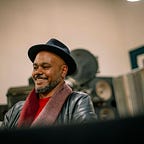The invisible tourist
The invisible tourist walks around town making promises he can’t keep. It’s an old habit, he’s an old man. The recorder in his pocket knows the method: walk purposely, but not as if you have some place to be at, walk like there is someone you want to meet. Look people in the eye. Purchase only the mundane and the disposable. Down here, invisibility requires a bold and almost rude awakening of the senses, a quick hand, the kind of patience one would only expect from the wise. The tourist never comments on the architecture, the weather, the women. Gently, he makes his way through the introductions until a quiet silence precedes the real talk.
This is Tunis, twenty-fourteen, these are not my first impressions.
“Spring will bless the new Constitution.” She looks out the cab window as if to seal the prophecy, to confirm that the last winter rains will wash away the dirt and the traffic, the bitter parliamentary quarrels, the scary rumors about the eastern influence on local affairs. A young man blew himself up trying to make a bomb, “one of our neighbors insulted my aunt for not wearing the veil”, you hear these things now. Leila knows better than to feed the cliches about a progressive revolution turned sour, but it’s hard not to talk about it. It’s hard not to think about Egypt.
What happened here? Was it just a coincidence between the unexpected demise of a long-standing dictatorship and the global ripple effects of network culture? Thirsty for new symbols, did everyone read too much into the Tunisian spring? What is happening now?
“It’s like in a lot of other places, there are actually two things going on simultaneously, two parts of the country battling to define the future.” We’re now sitting in a sunny terrace in Gammarth, inside a shopping mall where a sleepy-looking security guard checks your bag for bombs at the entrance. The main supermarkets have metal detectors, too. “Ben Ali got too old, too slow for the needs of the urban bourgeoisie. They were fed up with not being able to prosper. Young people were fed up, too, unemployed and bored, the network was just the accelerator and the extra spark. I think Tunisia showed the world how strange things are going to be from now on, the new normal, you know?”
Leila smiles, sips her drink and goes on to talk about the other part of the country, the rural and the urban poor, the unplugged, those who voted Ennahda into power and have since the revolution become a very visible part of Tunisian society. Those whom the “eastern influence” seeks to captivate with food programs, shelter, education. The masses who, not surprisingly, do not correspond to the liberal and idealized version of an Arab Spring. She says the new Constitution is a real victory against all this divisiveness, approved almost unanimously in parliament, a legal guarantee against any unpredictable twists of representative democracy.
She drops me off back in Tunis, downtown, where a few hundred people are marking the anniversary of Chokri Belaid’s assassination. The invisible tourist heads off to the heart of the Medina.
The Medina is not random: the houses are based on a number of intricate codes, too local do decipher. The notion of public space is ambiguous. Recorder now in hand, I play a game of memory, zig-zagging to find an ancient coffee house and some people to talk to. How long has it been since the last time?
The Al-Zaytuna Mosque overlooks the city from the northern entrance. It’s now almost five o’clock and kids are either going home from school or already playing soccer in the courtyards, the sound of the surrounding markets is fading out. The jitters got me, too much hospitable coffee. As I make my way out, I think of the summer and what it does to this place — I miss it.
Like a spy, thinking of spies, the invisible tourist will not be missed.
Merci, Mourat et Moez, à la prochaine.
